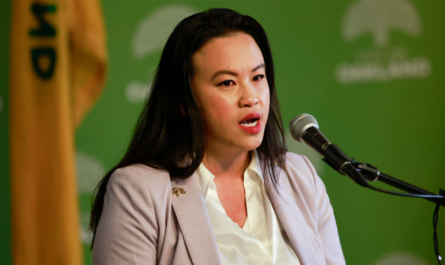As a wave of pro-Palestinian activism on college campuses showed few signs of abating on Tuesday, the demonstrations have raised new questions about what shape the end of the semester may take for thousands of students across the United States.
At Columbia University, where the arrests of more than 100 protesters unleashed a flurry of national protests, students will have the option to attend their last week of classes remotely for safety reasons. Several schools across the Northeast closed parts of their campuses to the public, in an effort to conclude the year quietly.
And at the University of Michigan, leaders were already looking ahead and bracing for graduation. They set up designated areas for demonstrations, and said that administrators would “generally be patient with lawful disruptions.”
The steps are an acknowledgment that the last weeks of the spring could be some of the most difficult for administrators at some of the nation’s most prestigious universities. Dozens of people were arrested this week at Yale and New York University after students erected protest encampments. Other demonstrations continue to emerge from coast to coast, including at the University of Minnesota, the University of California, Berkeley, and Emerson College.
A pro-Palestinian student movement has disrupted campus life, especially for Jewish students. Many have said they no longer feel safe in their classrooms or on university quads as the tone of protests at times has become threatening.
At the same time, many school leaders may face the possibility of graduation ceremonies transforming into high-profile stages of protest over the war in Gaza.
No matter how administrators approach these final weeks, the stakes are uniquely high for students who are graduating. Many graduated from high school in the first months of the pandemic, and never walked across the stage or celebrated alongside their classmates.
“Commencement ceremonies have been the site of free expression and peaceful protest for decades,” the University of Michigan said in an online message, adding, “And they will likely continue to be.”
The tumult on campuses escalated after Columbia’s administration called in the police last week to arrest student protesters who had organized a large encampment on a school lawn and refused to leave.
On Tuesday morning at Yale, where dozens of people had been arrested less than 24 hours earlier, dozens of students took over a central quad to chant “Free Palestine” and demand that their school divest from military weapons manufacturers.
“There is an intention from folks to keep going, to keep holding space and to keep bringing awareness to what’s happening in Gaza and what Yale’s doing,” said Chisato Kimura, 24, a student at Yale Law School.
It was not yet apparent whether the turmoil on campuses would prompt additional arrests, or whether college leaders would adopt a less aggressive playbook as the semester winds down. Many administrators, watching the uproar at Columbia, seem to be choosing other strategies to handle protests.
Others have sought to hit the brakes after their initial responses only inflamed unrest.
At Barnard College, Columbia’s affiliate school, many student protesters had received interim suspensions for last week’s tent demonstration. But in a Monday night email, the school’s president, Laura Ann Rosenbury, extended an olive branch.
The school would lift most of the suspensions and restore students’ access to campus, she said, as long as they promised to follow the rules. Those who still face discipline would have access to hot meals, mental health counseling and academic support. And with a professor’s permission, they could also finish out their semester virtually.
“I strongly believe that exposure to uncomfortable ideas is a vital component of education, and I applaud the boldness of all of our students who speak out,” Ms. Rosenbury said in the email, her first message since the arrests of protesters on Columbia’s campus last week, several of whom were Barnard students.
“But,” she said, “no student should fear for their safety while at Barnard”
She added: “In these last few weeks together before our seniors graduate, let’s be good to one another.”
Some universities are still reeling from the past few days.
At Columbia, hundreds of faculty members joined a walkout on Monday and signed open letters criticizing the university’s president, Nemat Shafik, for her handling of demonstrations. The threat of a formal censure resolution from the school’s faculty looms. And many Republican lawmakers are still calling for her resignation, arguing that the school has failed to safeguard its Jewish students.
The decision to offer hybrid classes seemed to be a tacit acknowledgment that many students were, at the very least, uncomfortable at the school. A large encampment of protesters remains in the center of campus, and occasional outbursts of demonstrations have occurred outside campus gates over the last 24 hours, but otherwise things have been quiet during what is typically a bustling final week of the semester. The last day of classes is April 29.
Angela V. Olinto, the university provost, said in an email on Monday night that if even one student wanted to finish out the year online, professors should offer hybrid classes — or move to fully remote if that is not an option.
“Safety is our highest priority,” Dr. Olinto said.
Eliza Fawcett contributed reporting.



